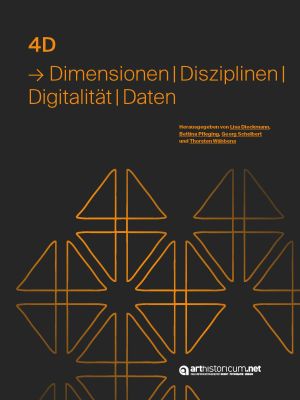Authors
Lisa Dieckmann (Ed.), Bettina Pfleging (Ed.), Georg Schelbert (Ed.), Thorsten Wübbena (Ed.)
4D
Dimensionen | Disziplinen | Digitalität | Daten
20 years ago, prometheus was launched as a distributed digital image archive for art history and image-based disciplines, marking a fundamental step for the digital transformation in the respective subjects. Since then, the contours of a future digitally supported science have become clearer. The Digital Humanities are expanding the methodological field of the humanities, interdisciplinary collaboration to answer research questions is increasingly gaining acceptance, and the establishment of a National Research Data Infrastructure is laying the foundations for a science system in transition.
The 2021 anniversary conference discussed the transformation of the sciences under four perspectives (4D) and deliberately went beyond the subject boundaries of art history.
In this publication, the contributions appear successively. They are edited, have the final layout and are included unchanged in the full volume. Each early-view article receives a persistent DOI and is thus fully citable; only no pages can be given yet. Only when all articles are available will they be given page numbers. Please use the citation recommendation given in the PDF for the Early View. In addition to the e-book (PDF), a print edition will also be published.
Chapters
Table of Contents
Pages
PDF
Peter Bell
Odeuropa – Kulturgeschichte der Gerüche
Gudrun Styhler-Aydın
Ephesos 4D: Die virtuelle Stadt
Sander Münster, Heike Messemer
HistStadt4D – Stadtgeschichte in vier Dimensionen
Vera Grund
Ballett, Digitale Musikedition, MEI, MovEngine, Edirom, Wiener Ballettrepertoire
Tessa Gengnagel
Digitale Editionen jenseits des Textes: Zur multimedialen Überlieferungsvarianz von Bild- und Filmwerken
Vera Tönsfeldt
Digitalisierung, Antiziganismus, Community, Datenbank, Racial Bias, Sammlung, Aktivismus
Michael Gref, Nike Matthiesen
Deep Learning, Emotionserkennung, Zeitzeugeninterviews, Multimodalität
Stefanie Schneider
iART – Nutzbarmachung und Auswertung großer Bilddatenmengen im geisteswissenschaftlichen Forschungsprozess
Susanne Pfalzner
Automatische Bilderkennung in der Astrophysik
Torsten Bendschus, Lara Mührenberg, Corinna Reinhardt, Ronak Kosti, Prathmesh Madhu, Ute Verstegen
Linda Freyberg, Sabine de Günther
Restaging Fashion: Visuelle Exploration und Narration eines Modekosmos
Nina Niedermeier
Visuelle Ähnlichkeit als relationaler Formbegriff: Automatische Bilderkennung frühneuzeitlicher Porträtgrafik
Yvonne Schweizer
Beeples Versionen. Plattformbasierte Arbeiten zwischen Digitalkultur und Werkstatus
Margarete Pratschke
#Twitter einschalten. Sofort – Digitale Bildkultur als Forschungsherausforderung
Torsten Schrade
prometheus5D – Dezentralität als Vision und Chance verteilter Forschungsdateninfrastrukturen
Martin Raspe, Georg Schelbert
Digital Humanities, kunsthistorische Fachinformatik, digitales Publizieren, Knowledge Graph, Computer Vision, Fachmethodik
Stefan Alschner
Visualisierung, Sammlungsforschung, Kataloge
Harald Sack
Knowledge Graphs
Christine Henniger, Sara Tiefenbacher
Mediatheken der Darstellenden Kunst digital vernetzen
Maria Effinger
„German Sales“ reloaded! Digitale Quellen für die Provenienzforschung
Julia Rössel
Datenqualität – Eine Frage der Form(en)








